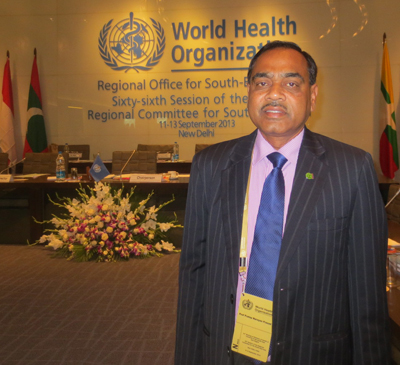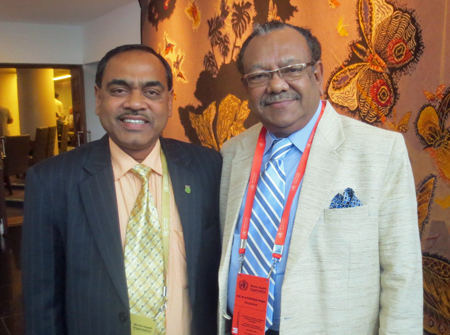WONCA South Asia Region president attends regional WHO committee

WONCA South Asia region president, Prof Pratap Prasad, of Nepal, prepares for the meeting.
Introduction
The meeting was attended by representatives of all 11 member states of the region, United Nations and other agencies, nongovernmental organizations having official relations with WHO, as well as observers. The joint inauguration of the sixty sixth session of the WHO regional committee for South Asia region and the thirty-first meeting of Ministers of Health of Countries of South East Asia region was held on September 10, 2013. His Excellency Mr Pranab Mukherjee, Honorable President of India, delivered the inaugural address.
Inaugural session
1. In his welcome address, Dr Samlee Plianbanchang, Regional Director, WHO South East Asia Region, warmly welcomed the Ministers of Health and representatives of the Member States of the WHO South East Region
2. The regional director noted with satisfaction that wild polio virus transmission in the Region had been terminated in 2011 and 90% increase in immunization coverage in the Region, had been achieved. He said that many countries had already reached the MDG targets and agreed on universal coverage as a strategy in the post-2015 development agenda.
3. In her address, Dr Nafsiah Mboi, Honorable Minister of Health of Indonesia and Chairperson of the thirtieth Meeting of Health Ministers, recalled that at the previous Meeting of Health Ministers hosted by the Government of Indonesia, the Yogyakarta Declaration on Ageing and Health had been adopted. The progress made in expansion of universal health coverage and development of a regional framework for non communicable diseases, ensured that equitable, affordable and accessible treatment, care and support was provided through the primary health care.
4. The Director-General of WHO, Dr Margaret Chan termed this year’s World Health Day theme as “high blood pressure”. Dr Chan noted that the key challenge of public health was to get more people checked early, ideally routinely, and then properly managed. Countries with health systems based on primary health care were on the best position to do this. She encouraged the Ministers of Health to adopt the New Delhi declaration on High Blood Pressure, which calls upon governments to commit to building partnerships among various stakeholders at the national, regional and global level.
5. His Excellency noted that although the countries of WHO South East Asia Region represent a quarter of the global population, and the per capita total expenditure on health was the lowest. To achieve universal health coverage, it will be necessary to strengthen the primary health care systems through prevention and promotion activities and by optimal utilization of scarce resources. Strategic investments in medical education and training would go a long way in enhancing the availability of health care professionals for all communities.
6. Expressing his concern about the health of elderly who are a precious social asset, the Honorable President underscored the need to effectively implement the Yogyakarta Declaration on Ageing and Health 2012. His Excellency stressed the need to define health priorities for the global developmental agenda beyond 2015.
 Photo: Prof Pratap Prasad, WONCA South Asia region president (left) with the Minister of Health of Bangladesh
Photo: Prof Pratap Prasad, WONCA South Asia region president (left) with the Minister of Health of Bangladesh
Key agenda and report on the work of WHO
Introduction to the Regional Director’s Annual Report on the work of WHO in the South East Asia Region covering the period 1 January to 31 December 2012.
1. Intensified efforts for routine immunisation which started on 2012 were progressing well with all countries achieving at least 90% national coverage. Significant progress had been made in measles immunisation
2. The region is aiming at eliminating HIV infections among children by 2015
3. Tuberculosis (TB) prevalence had reduced by almost 40% between 1990 and 2015
4. The regional director noted that non communicable diseases (NCDs) are the leading cause of death in most member states. More than 60% of all deaths are due to NCDs. Recognition of NCDs as a priority on the public health agenda was increasing and Member states were strengthening national health systems for sustainable NCD prevention and control.
5. Environmental hazards continued to be a major public health challenge in the Region. Around 19% of all cancers are attributed to environmental factors, particularly occupational exposure to chemicals and chemical contamination in the food chain.
Address by the Director General of the World Health Organization
In her address to the Committee, the Director General, Dr Margaret Chan said that universal health coverage is an important way to address inequalities and inequities in health. Universal health coverage is firmly rooted in primary health care and countries have had a head start in achieving it by staunchly supporting primary health care. She noted that the technical discussions on Universal Health Coverage recommended a phase-wise approach, whereby elimination of inequities and inefficiencies is the initial focus.
Moving towards universal health coverage means increasing access to medicines, vaccines and other interventions. She noted that the South East Asia Region has 60% out of pocket expenditure on health, which is the highest among all WHO regions. Dr Chan asserted that based on the experience of other regions, the ambitious goal of measles and rubella control in South East Asia Region by 2020 is feasible.
Dr Chan said that all the health experts have given cardinal careful attention to the prevention and control of NCDs including the nine voluntary targets by using available data to assess them in the regional context. She said that participations were well aware of the public health problems posed by NCDs. In some countries, a fundamental reorientation of the health system is needed. She concluded that once universal health coverage translates into reality, it will benefit all the citizens and give the poor “a route towards a decent life”.
Statement by Prof Pratap Prasad
Prof Pratap Nayaran Prasad, WONCA South Asia region president was permitted to make a statement about WONCA to the meeting. His words were as follows:
WONCA is a the World Organisation of Family Doctors whose main aim and objective is to serve the unserved people and provide the primary health care in the community under universal health coverage. WONCA South Asia Region is committed to the philosophy of above statement. Under this coverage, I, as the president of WONCA-SAR, would like to make a statement on this gathering to make accountable for South Asia region. On the following point I want to gather attention of WHO/SEARO:
1. Primary Healthcare: to reach the unreached of South Asia Region by family doctors
2. Recognition of role of family physician/GP to achieve the goals of MDG in South Asia Region
In the era of advanced technology and super-specialty, primary health care service is still questionable in this region. Only family physician/GP can cope up with this situation and provide better health care to community. WHO-SEARO must recognise and deliberate importance of the family physician/GP in this region. I look forward to this gathering and request WHO-SEARO to address in those countries where family physicians are not identified as first line consultant doctor.I would like to thank the organisation for allowing me to make a statement in this prestigious gathering.
Twelfth General Programme of Work (GPW) and Proposed Programme Budget 2014-2015
The committee noted that World Health Assembly, in May 2013, had approved the Twelfth General Programme of Work (GPW) , which establishes:
- the overarching health mission, principles and values
- changes to the results-based framework
- six high level health leadership priorities
- six categories of work
- 30 technical programme areas
- the aspiration of results of the Organization for a six year period 2014-2019
The Director General urged the health ministries when planning work to be conducted with the WHO, to focus on a limited set of priorities (between three and five), in order to be able to deliver key health objectives.
Prof Pratap Prasad
WONCA South Asia Region President.